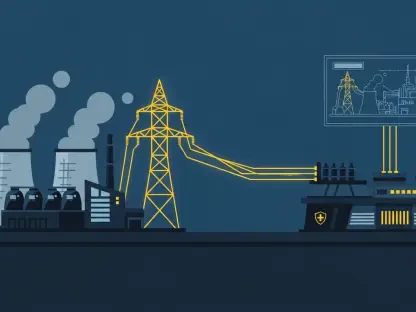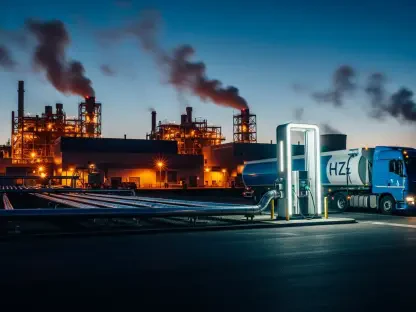In a time when energy costs are skyrocketing across England and Wales, leaving countless families grappling with the impossible choice between heating their homes and affording basic necessities, National Grid has stepped forward with a significant £2.3 million funding package to offer much-needed relief. This initiative forms the second phase of the broader £10.5 million Grid for Good Energy Affordability Fund, a three-year commitment designed to combat energy poverty. Targeting over 16,000 vulnerable households, the program seeks to deliver both immediate financial support and sustainable solutions to ease the burden of escalating bills. By addressing the urgent needs of those most at risk, particularly as colder months approach, National Grid aims to ensure that no family is left in the dark or cold due to financial hardship. Through strategic partnerships and a focus on long-term impact, this effort highlights a growing recognition of energy affordability as a critical social issue that demands innovative and compassionate responses.
Addressing Energy Poverty
Immediate Relief for Families in Crisis
Energy poverty often strikes hardest when temperatures drop, forcing many households into desperate situations where heat and power become unaffordable luxuries. National Grid’s recent funding allocation prioritizes emergency interventions to tackle these immediate crises head-on. The £2.3 million package facilitates same-day fuel vouchers and direct financial aid, ensuring that families can restore essential services without delay. These measures are particularly vital for those who find themselves suddenly unable to cover energy costs due to unexpected financial setbacks. Partner organizations work swiftly to identify and assist households on the brink, preventing health risks associated with unheated homes. This rapid response mechanism is a lifeline for thousands, offering a buffer against the harsh realities of winter while more permanent solutions are put into place. By focusing on urgency, the initiative addresses the most pressing needs first, providing a foundation of stability for further support.
Beyond the initial relief, the program’s emergency assistance also aims to mitigate the ripple effects of energy poverty on vulnerable populations. For many families, the inability to afford heat exacerbates existing challenges, such as poor living conditions or mounting debt, creating a cycle of hardship. The funding enables frontline charities to deliver tailored support, ensuring that aid isn’t just a temporary fix but a step toward recovery. This includes connecting households with resources to cover overdue bills or providing interim solutions while long-term plans are developed. Such efforts are crucial for maintaining dignity and safety, especially for those with children or elderly members who are most at risk in cold environments. The emphasis on immediate action reflects a deep understanding of how quickly energy crises can spiral, underscoring the importance of timely intervention in breaking the cycle of fuel poverty for those in dire straits.
Targeting the Most Vulnerable
A cornerstone of National Grid’s initiative is its deliberate focus on reaching households that often fall through the cracks of traditional support systems. Low-income families, individuals with health conditions worsened by cold temperatures, and those living in energy-inefficient homes are prioritized for aid under this £2.3 million fund. These groups frequently miss out on government assistance due to eligibility gaps or lack of awareness, leaving them disproportionately burdened by rising energy costs. By identifying and targeting these at-risk communities, the program ensures that resources are directed where they are most needed, addressing disparities in access to warmth and power. This targeted approach not only alleviates immediate financial strain but also tackles systemic inequities that perpetuate fuel poverty across England and Wales, creating a more inclusive safety net.
Furthermore, the initiative recognizes the unique challenges faced by each vulnerable group and adapts its support accordingly to maximize impact. For instance, households with medical conditions that require consistent heating receive priority for emergency aid to prevent health deterioration, while those in poorly insulated homes are flagged for efficiency upgrades. Community-based outreach plays a pivotal role in this process, as partner organizations engage directly with local populations to uncover hidden needs. This personalized strategy ensures that aid isn’t distributed blindly but is instead tailored to specific circumstances, enhancing its effectiveness. By focusing on the most marginalized, the fund addresses not just the symptoms of energy poverty but also the underlying barriers that keep certain households trapped in financial distress, paving the way for more equitable energy access over time.
Sustainable Solutions for the Future
Long-Term Energy Efficiency
While emergency aid provides a critical safety net, National Grid’s vision extends far beyond temporary relief, aiming to create lasting change through energy efficiency improvements. A significant portion of the £2.3 million fund is dedicated to installing modern, low-carbon heating systems like air source heat pumps in homes that are otherwise ineligible for government support. These upgrades drastically reduce energy consumption, cutting bills for families over the long haul and lessening their reliance on emergency assistance. Additionally, the adoption of smart energy technologies helps optimize usage, further driving down costs. Such measures not only address the financial burden of high energy expenses but also align with broader environmental goals by reducing strain on the electricity grid. This forward-thinking approach ensures that vulnerable households are equipped to weather future challenges with greater resilience.
Equally important is the focus on sustainable infrastructure as a means of breaking the cycle of fuel poverty for good. Many homes targeted by this initiative suffer from outdated or inefficient heating systems that inflate costs unnecessarily, trapping residents in a loop of unaffordable bills. By replacing these with energy-efficient alternatives, the program tackles a root cause of high expenses, offering a permanent reduction in energy demand. Partner charities play a key role in identifying eligible households and coordinating installations, ensuring that upgrades reach those in greatest need. This investment in long-term solutions reflects a commitment to not just alleviating current hardship but preventing its recurrence, fostering financial stability for families while contributing to a greener energy landscape. The dual benefit of cost savings and environmental impact positions this effort as a model for addressing energy poverty sustainably.
Education and Empowerment
Knowledge is a powerful tool in the fight against energy poverty, and National Grid’s initiative places significant emphasis on educating households to manage their energy use more effectively. Through personalized advice delivered by partner organizations, families learn practical strategies to reduce consumption without sacrificing comfort, such as optimizing heating schedules or identifying energy-wasting habits. These educational efforts are designed to empower individuals with the skills needed to take control of their energy expenses, fostering a sense of agency amid financial challenges. By demystifying complex billing structures and usage patterns, the program helps households make informed decisions, ensuring that small changes lead to meaningful savings over time. This focus on education transforms passive recipients of aid into active participants in their energy future.
Complementing these efforts are Smart Energy Action Plans, which integrate households into a more sustainable and cost-effective energy system. These plans, developed by expert charities, introduce families to innovative tools like smart tariffs and solar PV options, aligning their usage with greener, more affordable practices. The goal is to create a seamless transition to modern energy solutions that benefit both the household and the broader grid. Tailored guidance ensures that even those unfamiliar with such technologies can adopt them confidently, breaking down barriers to access. This empowerment through education and innovation not only reduces immediate financial pressures but also builds a foundation for long-term independence from emergency support. By equipping vulnerable communities with actionable knowledge and resources, the initiative fosters resilience, ensuring that families are better prepared to navigate the evolving energy landscape with confidence.
Collaborative Partnerships
Strength in Unity
The success of National Grid’s £2.3 million funding package hinges on a robust network of charity partners, each bringing specialized expertise to the table in combating energy poverty. Organizations like Citizens Advice, Fuel Bank Foundation, and National Energy Action play distinct yet complementary roles in delivering a spectrum of services, from emergency fuel vouchers to energy efficiency upgrades. Citizens Advice, for instance, supports thousands with tailored energy-saving guidance, while Fuel Bank Foundation focuses on same-day relief for those in crisis. National Energy Action, meanwhile, targets warmth and bill reduction through comprehensive support packages. This collaborative framework ensures that the diverse needs of vulnerable households are met with precision, amplifying the reach and impact of the fund. Together, these partnerships create a cohesive response that addresses energy poverty from multiple angles.
Moreover, the synergy among these organizations enhances the efficiency of aid distribution, ensuring that resources are allocated where they can make the most difference. Each charity leverages its unique strengths—whether it’s community outreach, technical expertise in energy upgrades, or rapid crisis response—to cover gaps that a single entity might overlook. Regular coordination between National Grid and its partners facilitates seamless communication, preventing duplication of efforts and maximizing the fund’s effectiveness. This united front also builds trust within communities, as households see a consistent, reliable network working on their behalf. The strength derived from such collaboration underscores the power of collective action in tackling complex social issues like fuel poverty, demonstrating how diverse expertise can converge to create meaningful, widespread change for those in need.
Shared Vision and Impact
Stakeholder perspectives reveal a unified optimism about the transformative potential of this initiative, emphasizing the critical role of collaboration in achieving lasting results. Leaders from National Grid and partner charities alike stress that addressing energy poverty requires a multi-faceted approach, combining immediate relief with proactive prevention. This shared vision prioritizes creating healthier, warmer homes while equipping families with tools to avoid recurring crises. Comments from charity heads highlight the importance of community outreach in identifying hidden needs and ensuring aid reaches the most isolated households. Their collective commitment to transparency—through clear reporting on fund allocation and outcomes—further strengthens the program’s credibility. This alignment of goals fosters a powerful coalition dedicated to uplifting vulnerable communities across England and Wales.
Reflecting on the broader impact, the initiative’s focus on measurable results stands out as a key driver of its success. Partnerships have already supported tens of thousands of homes through prior funding rounds, and the current phase aims to extend that reach to over 16,000 additional households. Stakeholders emphasize that the true value lies in the tangible differences made—whether it’s a family staying warm through winter or a home becoming more energy-efficient. The collaborative effort also sets a precedent for future programs, showing how shared accountability and diverse strategies can address systemic challenges effectively. By fostering dialogue and aligning on common objectives, National Grid and its partners have created a blueprint for impactful intervention, ensuring that the fight against energy poverty continues to evolve with community needs at its core.









